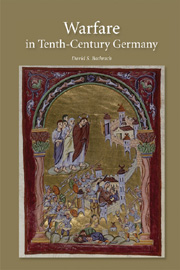Book contents
- Frontmatter
- Contents
- List of Illustrations
- Acknowledgments
- Abbreviations
- Introduction
- 1 Restoring Francia Orientalis: Henry I's Long Term Strategy
- 2 Forging a New Empire
- 3 Military Organization
- 4 Military Education
- 5 Arms and Training
- 6 Morale
- 7 Tactics on the Battlefield
- 8 Campaign Strategy: The Civil War of 953–954
- Conclusion
- Appendix: Major Military Operations by Henry I, Otto I, and Their Commanders
- Bibliography
- Index
- Warfare in History
2 - Forging a New Empire
Published online by Cambridge University Press: 05 February 2013
- Frontmatter
- Contents
- List of Illustrations
- Acknowledgments
- Abbreviations
- Introduction
- 1 Restoring Francia Orientalis: Henry I's Long Term Strategy
- 2 Forging a New Empire
- 3 Military Organization
- 4 Military Education
- 5 Arms and Training
- 6 Morale
- 7 Tactics on the Battlefield
- 8 Campaign Strategy: The Civil War of 953–954
- Conclusion
- Appendix: Major Military Operations by Henry I, Otto I, and Their Commanders
- Bibliography
- Index
- Warfare in History
Summary
When Otto I succeeded his father in 936, the horizon for conceptualizing his political and military policies was far broader than it had been for Henry. As a result of his father's conquests, the young king inherited an East Frankish/German realm that was larger and more powerful than any kingdom since the division of the Carolingian empire following the death of Louis the Pious in 840. Indeed, from the very beginning of his reign, Otto made clear that he saw himself as the natural successor of the great Charles, not least by having himself crowned at Aachen.
When Otto formulated his medium and long-term strategy for maintaining the hegemonic position of the eastern kingdom, he chose to follow the reasoning that Henry pursued in the west. Thus, Otto limited his initiatives to a policy of intervening in the affairs of Francia occidentalis for the purpose of protecting Lotharingia from the revanchist designs of the Carolingian kings Louis IV (936–954) and Lothair IV (954–986), his brother-in-law and nephew respectively. Otto was content to play a dominant role in the political affairs of the western kingdom, often acting as an arbiter between the conflicting claims of the king and the West Frankish magnates, including Hugh the Great, who was also Otto's brother-in-law. When necessary, Otto also deployed military forces in the west, some of which comprised very large armies.
- Type
- Chapter
- Information
- Warfare in Tenth-Century Germany , pp. 39 - 69Publisher: Boydell & BrewerPrint publication year: 2012

